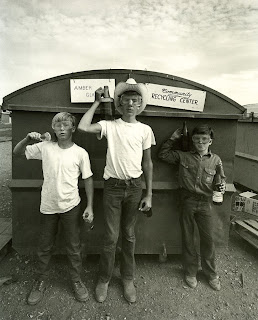"We have to move. My husband's been transferred to Southern California."
Discuss the issue of mobility among American Suburbanites?
How does the sometimes transient nature of the suburban lifestyle impact the nuclear family? What about the extended family? How might it alter one's sense of belonging?
Discuss how the whole issue of "resale value" is more a suburban than urban phenomenon.
How would this family's homemade "for sale by owner" poster fare in today's housing market?



























